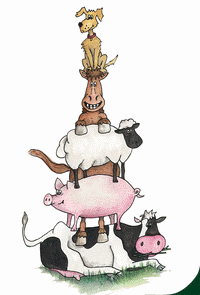Remember ‘one size doesn’t fit all’ when worming reminds Pfizer
With spring turnout onto new grass just around the corner, now is a key time to think about worming this year. The experts at Pfizer Animal Health explain why it’s important to remember that ‘one size doesn’t fit all’ when it comes to planning your worming strategy.“All horses respond differently to the same circumstances so it’s imperative to assess every horse independently as well as of a part of the group in which it is kept, when you plan your worming tactics,” says Wendy Talbot, Pfizer’s veterinary advisor. “We have put together six top tips to help you stay on track this year, to keep your horses healthy and performing at their best.”
- Treat every horse as an individual when treating them, assess their age, health status and past history carefully. Horses with worms will shed eggs onto the pasture, as a part of the parasite’s natural life cycle. However, some horses will naturally cope better and shed less worm eggs. Conversely, some horses, especially debilitated or young animals, will pass more worm eggs in their faeces. These ‘high shedders’ can infect the pasture in a short space of time and consequently increase the pasture challenge to other horses that share their grazing, so it’s important to identify them and treat them appropriately. The best way to do this is with a simple worm egg count on the dung (Faecal Worm Egg Count)
- Use faecal worm egg counts (FWEC) properly: Remember a single FWEC is only a rough indication of a horse’s worm burden at a specific point in time and results may vary between consecutive tests. FWECs are very useful for identifying which horses are shedding high numbers of eggs. Regular FWECs throughout the grazing season will in time build a clearer picture of a horse’s worm burdens and shedding patterns - it’s the best way to identify which horses need routine treatments and those which do not need worming every time.
- Dose accurately: When you have identified that a wormer is needed you should always select the one most appropriate for the parasite you are targeting. You must also make sure you treat each horse accurately according to weight. This will help to maintain the effectiveness of the wormers available.
- Remind horse owners to keep their pastures clean: Clean grazing reduces overall worm burdens and reduces the need for excessive use of wormers. Remind horse owners to poo pick regularly during the grazing season – ideally every day. Cross-grazing with sheep and cattle is also effective at reducing horse parasite burdens on the pasture as they will ‘hoover up’ the worms without being affected.
- Take advantage of the persistent effect of some wormers: Some wormers, such as those containing moxidectin, have persistency against cyathostomin larvae. For high risk horses, in some instances using these products at the beginning of the grazing season may well mean that the horse could provide a ‘clean up’ mechanism for the pasture for the first couple of weeks. This may reduce the overall worm burden on the pasture and horses, reducing the build up of worms over the grazing season and hence reducing the number of worming doses needed over the later summer months. It’s always important to advise horse owners as to whether a wormer is required at specific time for individual horses.
- Remember to strategically dose for tapeworm in the spring and autumn and for encysted small redworm and bots during the winter.
Stable Mate is a new App from Pfizer that makes it easy to manage daily equine healthcare regimes, including worming. Stable Mate is available from the iPhone App Store and Google Play Store: text Stable Mate to 80800 to download. To find out more visit www.wormingyourhorse.info.


